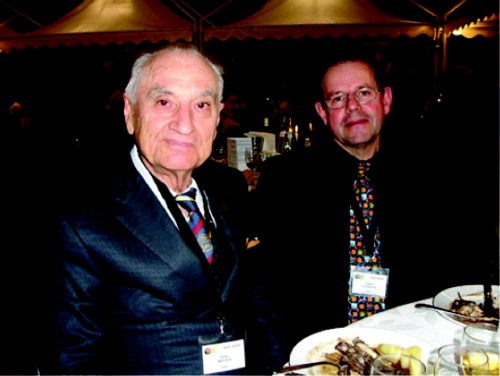When in 1997 I initiated research on resveratrol, a well-known polyphenol of red wine, I soon and carefully read the publications of Professor Serge Renaud & Co and evaluated the importance of their work. His epidemiological studies became a reference for me to set up new experimental protocols. Particularly his publication in Epidemiology (Renaud, Gueguen, Schenker, & d'Houtaud, 1998) showing that a moderated consumption of wine decreased the relative risk of cancer by 22%. This article followed his breakthrough paper published in Lancet (Renaud & de Lorgeril, 1992) describing the basis of the French paradox which was the following: ‘Compared to USA, France while showing a high level of risky factors such as tobacco, cholesterol, hypertension and the consumption of saturated fat, presents a low cardiac mortality’.
My first participation in the OIV congress (vine and wine international organization) was in 2000 in Paris. I was impatient to meet Professor Serge Renaud who was the chairman of the wine and health session. I presented to him the first results of my team on the inhibitory effect of resveratrol on cancer cells. He told me ‘I would suggest you should be interested in astringin which is even better than resveratrol’. He made no comments, leaving me the chance to understand why.
On another occasion I participated in a round table on wine and health in Montpellier where Professor Serge Renaud was under fire in passionate discussions on this most sensitive of topics. To a question on the risk-related to wine consumption, he answered: ‘Wine consumption is good for health if taken moderately. However, if you happen to have a weakness for this beverage or an addiction risk, please, go to consult your GP’. Thus, he showed an honest attitude.
Later, one of my privileges was to have Professor Serge Renaud as a special guest of the session ‘biological effect of wine compounds’ at the 1st WAC (wine active compounds) international congress in Beaune, France, March 2008. Although affected by poor health since 2003, but fortunately due to the friendly presence of Mrs Dr Dominique Lanzmann-Petithory, his close co-worker, we were able to spend precious moments together (see photo picture).
Recently, on 6 October 2012 I had the great honour to give a talk on the history of the French paradox to the 6th colloquium of the ‘Clos de Vougeot’ in Burgundy, organized by the UNESCO chair for ‘culture and tradition of wine’.
Wine has been a part of centuries of Mediterranean civilization, whether as a beverage, as a medicine, or as a nutrient, and now rather as a pleasure and a sociability element. Its perception by society has also evolved over time. From time to time praised, prohibited, suspected, scientifically correlated with the French paradox, or tentatively destroyed by adepts of meta-analyses or by comments dictated by ideological considerations. Due to its tenacity and his outstanding scientific qualities, Professor Renaud had the merit to resist to the various anti-wine lobby attacks. Through his work and his approach to it, at the end of the twentieth century he contributed to the affirmation of the wine culture and can be considered along with famous names such as Hippocrate, Galien or Avicenne.
Our grateful thanks to him and our deep respect.

References
- Renaud, S., & de Lorgeril, M. (1992). Wine, alcohol, platelets and the French paradox for coronary heart diseases. Lancet, 339, 1523–1526.
- Renaud, S.C., Gueguen, R., Schenker, J., & d'Houtaud, A. (1998). Alcohol and mortality in middle–aged men from eastern France. Epidemiology, 9, 184–188.